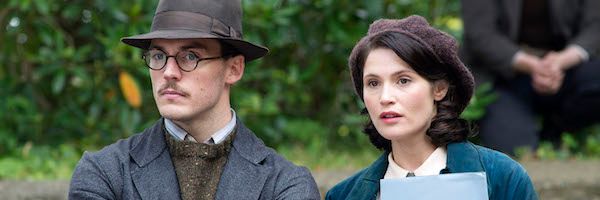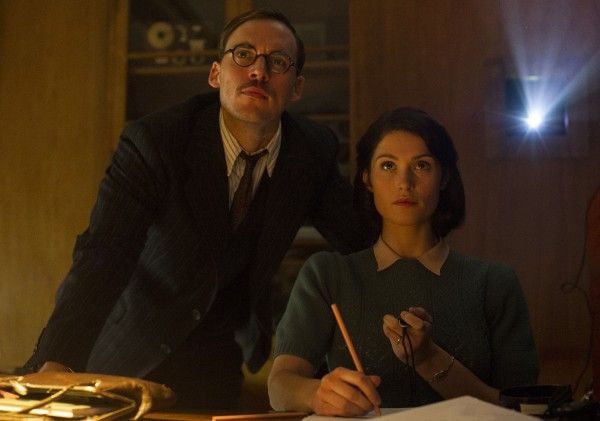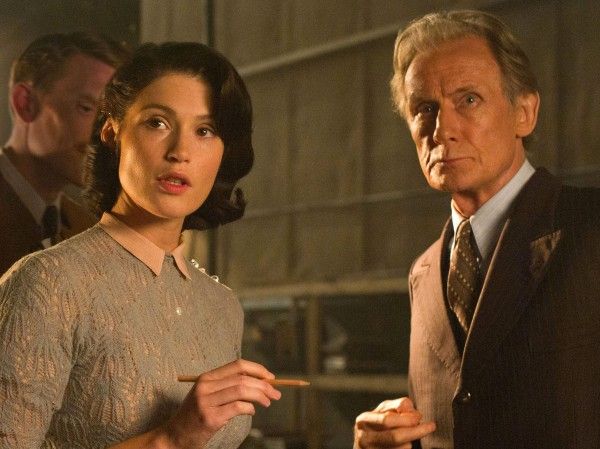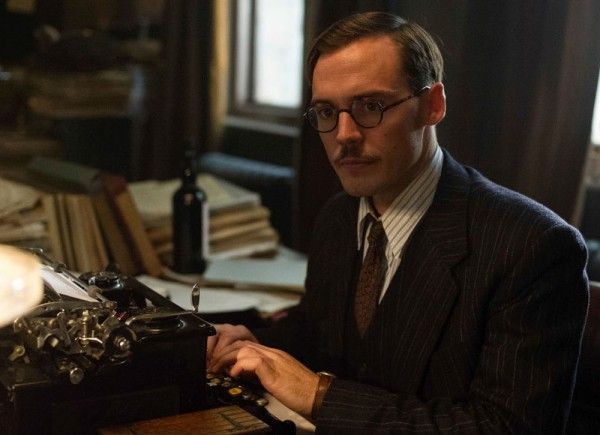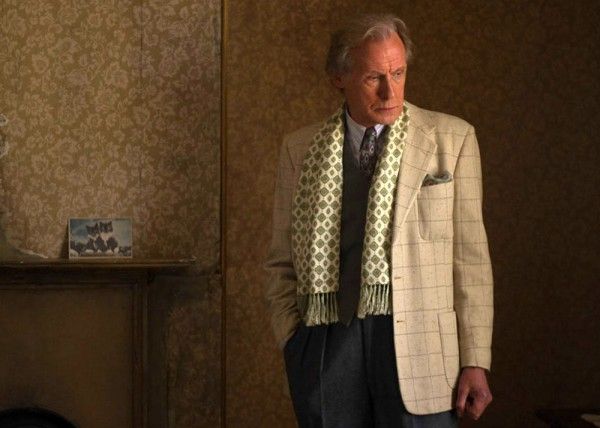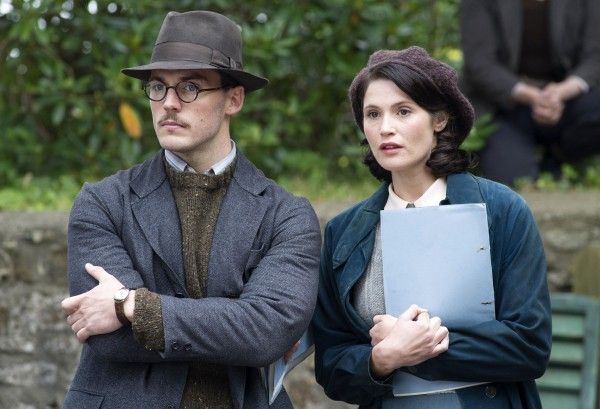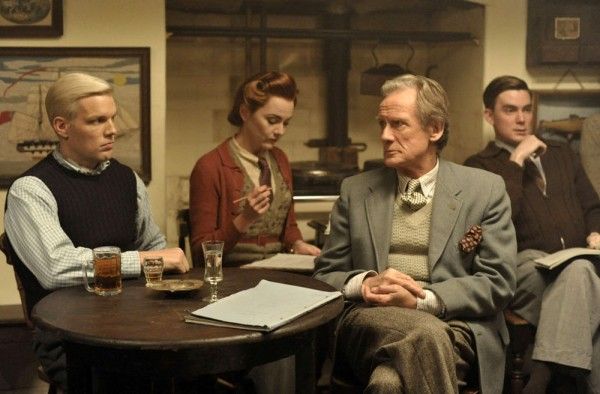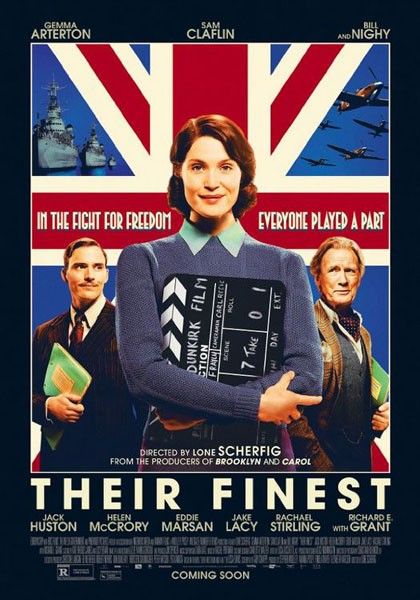From director Lone Scherfig and adapted from the novel Their Finest Hour and a Half by Lissa Evans, the romantic drama Their Finest is set in the midst of the devastating Second World War, when movies became a crucial outlet to raise the spirits of the nation during wartime. Catrin Col (Gemma Arterton) is employed to write female dialogue, referred to as “slop” by her male co-writers, for original British Ministry of Information propaganda feature films with fellow screenwriter Buckley (Sam Claflin), and as the two work together, they realize that there can be just as much passion behind the camera as there is on screen.
During this phone interview with Collider, co-stars Sam Claflin and Bill Nighy (who plays the self-absorbed but charismatic thespian, Ambrose Hilliard, whose days of being a romantic lead are well behind him) talked about what attracted them to Their Finest, the story’s feeling of nostalgia, learning to work on a typewriter, how dreamy it was to work with co-star Gemma Arterton, and why people love the collective experience of watching movies. Claflin also talked about My Cousin Rachel and the experience of working with Rachel Weisz, while Nighy talked about playing a very nice man in The Bookshop, opposite Emily Mortimer.
Collider: What was it about this script that made you want to be a part of telling this story and playing this character?
BILL NIGHY: To be honest, it was triggered by the prospect of working with (director) Lone Scherfig. That was my initial enthusiasm. And then, when I read the script, it was a wonderful script full of humor and humanity, which appealed to me. It was also something that I’m interested in. I’m interested in making movies and I’m interested in that period. People in the U.K. have a very specific nostalgia for that time, and I thought it beautifully expressed the details of how people’s lives were, during that time, and the general feeling, and how people can remain compassionate in truly dangerous times, rather than like compassion during strategically invented dangerous times. It’s a timely movie, in that respect. But, the script was very attractive.
SAM CLAFLIN: For me, personally, I’d been fortunate enough to work with Lone Scherfig, and she approached me with this script. After having such an incredible experience with her before, I knew that no matter what she gave me, I would happily jump aboard. Honestly, I fell in love with the script. I thought it was a really unique war story, set around a very poignant part of our history, but with an insight into a world that I wasn’t overly familiar with, with filmmaking at that time. I loved the beautifully poetic love story between Buckley and Catrin, and also the humor that Ambrose Hilliard brought. So, it ticked every box for me, really. And Gemma [Arterton] was already attached and I’d always wanted to work with her. It was a no-brainer.
This film has an almost fairy tale quality to it, while being set in the middle of a war, and it explores humor and tragedy in a very real, very relatable way. Was that clearly evident, when you read the script, or did that come out of fine turning during the shoot?
CLAFLIN: I thought it was all there, laid out in the text and the story, and even in the novel, which obviously came first. The world that was created and the rhythm and musicality that the script had felt almost like a musical. It felt quite uplifting and hopeful, and light and airy. It felt humorous and also quite nostalgic. It felt like a film of the time, and there’s something quite original about that. I think La La Land did it very similarly, in that it has that bounce in its step. As much as I don’t sing songs – Bill does – I felt really drawn to the musicality of it. You can’t ask for more, really.
Bill, what sort of research or preparation did you do, when it came to getting into the head of the character, in this world and during this time period?
NIGHY: One of the refreshing things about reaching my age is that, when I was younger, I would pretend and be vague about possible research I might have done. But when you ask me about how much research I did for this movie, the answer is none, whatsoever. I’m lucky to work, for the most part, at a level of writing where all of the information I need is contained within the script. Honestly, if there was something in the way that I walk or talk that I had to research, I would have researched it, or if there was something about the character’s occupation. But for the most part, I read the script and, in this case, I was blessed with a great director who could put me straight, if I went wrong.
Could you identify with your character’s struggle of wanting certain roles while people are trying to push you into other roles, whether it’s because of your age or some other specific reason?
NIGHY: Well, yeah, sure. When I read the script, I wanted Sam’s part, and then they offered me this other part. No, I’m kidding. When I was about 40, I took a phone call from my agent in England who said, “Hamlet, darling. It’s a tour, and it’s 18 months. It’s Moscow and Tokyo, it will be marvelous.” I said, “I don’t want to play Hamlet.” She said, “Oh, no, not Hamlet, darling, Claudius. You realize that you’re now Hamlet’s uncle.” Once you get passed that particular watershed, it’s plain sailing.
Sam, as a writer in this time period, you had no choice but to use a typewriter. Did you spend much time finding the rhythm of a typewriter, and did you feel pretty comfortable sitting at one?
CLAFLIN: I did hours and hours and hours of research, and the one thing that helped prepare me for this part was being given a typewriter about a month before, just to get used to how to type on one. It’s very, very different. And being a writer, I needed to be able to do that quickly and efficiently, so I had to learn to use all of my fingers and not just two of them. That was an honest piece of preparation that I had to do, and I know that Gemma did the same thing for Catrin Cole. But, I actually quite enjoyed it. There’s something really quite beautiful about the sound of a typewriter. I really grew attached to that, so I’m in the process of trying to track one down that I could put in my house to put me to sleep.
Both of these men develop very interesting relationships with Catrin, and it’s really fun to watch that develop, throughout the film. What did you most enjoy about exploring that dynamic, and how was it to work with Gemma Arterton?
NIGHY: It was dreamy to work with Gemma. She was exemplary, easy and wonderful to do business with. In terms of the relationship between the characters, Gemma’s character very cleverly immediately spots that there’s only one way to communicate with Ambrose Hilliard, and that’s very, very aggressively, from the start. It has a nice resolve, where they do come to some kind of accommodation between themselves, after having a rocky road. Ambrose spots that she can really write, and therefore she is of great value to him. Even though she manipulates him, he’s grateful for that.
CLAFLIN: I was slightly intimidated by Gemma and her talent, going into the process. She’s someone I’ve admired for a few years, and I think she’s done incredible work and made incredible choices, as an actress. So, coming into the process, a part of me was worried that, because she’s good, she probably wouldn’t like me. But actually, the two of us found a happy medium and a level playing field. I’d like to think we really enjoyed working together. She was incredible. She was really, really hardworking, but at the same time, she liked to have fun. She was able to push me when I needed to be pushed, and at the same time, she was able to drag me when I needed to be dragged. She has become a friend. That’s the best way of describing how we got on, during the process. I really, really enjoyed telling their love story. It’s about a man who doesn’t see the potential in a woman, and then he realizes that she’s probably his better. That, in itself, is a message and story that more people should take notice of.
Why do you think, even in times of war and tragedy, people still want to gather together and laugh and cry, over watching a story being told in a movie?
NIGHY: There are times when people say, “Cinema is dead,” or they say “Poetry is dead,” or “Painting is dead,” or “The novel is over.” It’s usually people that aren’t involved in that particular thing. It’s like vinyl is supposed to be over, but vinyl sales went from 900,000 to 12 million, in the last twelve months in the United States of America. People like to do things collectively, and there is nothing to quite substitute receiving a film in a group of people. That’s a large part of why people like the cinema, in the first place.
CLAFLIN: I also think people want to be moved, people wanted to be informed, people want to feel a certain way, even if they know it’s not good to feel that way. People need to be told that it’s okay to stand up for yourself, and to speak up and be heard. I think film is an opportunity, as much as music and art, where you can be told that it’s okay to be you and to be heard. Film is an opportunity to get that message out there.
Do either or both of you know what you’re going to be doing next, or are you currently working on something now?
CLAFLIN: I’m not working on anything right this second, but I’m about to start a new film that’s filming out in Tasmania in a month’s time (this interview was done on February 13th). It’s really, really interesting and a very, very different character to anything I’ve played before. I don’t know how much more I can talk about it because I don’t think it’s been officially announced, but it’s something I’m very excited by and really, really, really scared of, in many respects. But, it will be fun. And I have a couple of movies coming out soon, which is quite exciting.
NIGHY: I have several movies which I’m supposed to make this year, but I’ve gotten to the point where I’ll believe that when they give me the airfare. There’s some quite exciting things, which I probably shouldn’t talk about, at this point. I don’t know why, but I’m cautious. The next thing that will come out is a movie from Isabel Coixet, the imminent Spanish film director, who has adapted the Penelope Fitzgerald novel, The Bookshop, into a movie with Emily Mortimer playing the central role. That was a wonderful job that involved me going to Northern Ireland on the northern coast and Barcelona. That was a very pleasant engagement, and that will be the next thing in the cinema.
Who do you play in that?
NIGHY: I play a very, very, very nice man. I play the only man in the village that will support her, in any way. I did it because I am enthralled with Emily Mortimer. I think she is a marvelous actress and a wonderful person, and she makes me laugh. She asked me if I would go, and I pretty much would do whatever she told me to do. But I play a man who supports her against great odds, in the story.
You also have a very different, much darker and more sinister looking love story, with My Cousin Rachel. What was the appeal of that project for you, and how was it to have someone like Rachel Weisz to experience that with?
CLAFLIN: Amazing! I’ve never worked so close to someone with so much experience. Playing the dynamic of a love story with someone who is undoubtedly my better was really, really quite amazing and refreshing, and exciting and nerve-wracking. Working with Roger Michell, who directed it, was also an amazing experience. What was fascinating for me about the story is that I play a man who sort of becomes a boy. He’s a very naive and vulnerable character, who’s never experienced women or love before. That mixed up with everything else that story has to offer was really a quite enjoyable ride.
Their Finest opens in theaters on April 7th.

